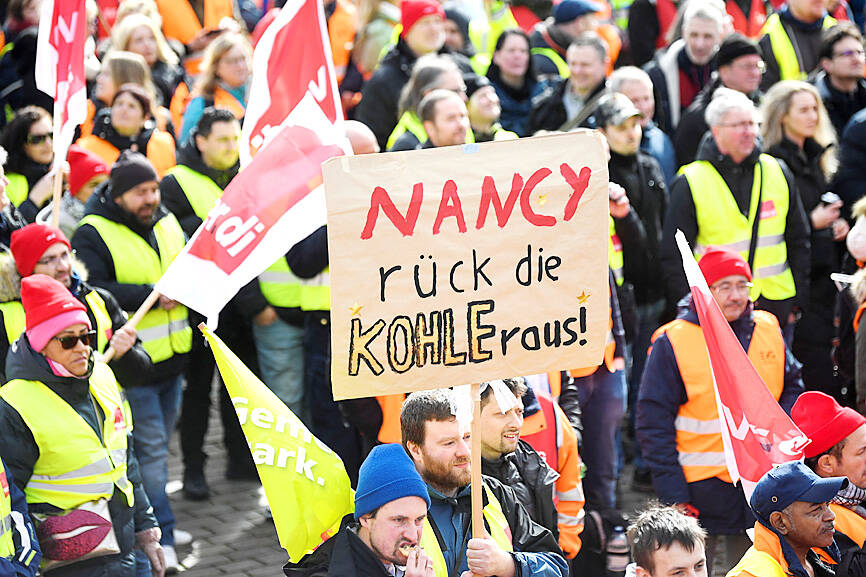A major strike yesterday brought much of Germany’s air traffic, rail service and commuter lines to a halt as workers demanded wage hikes in the face of brisk inflation.
Workers at airports, ports, railways, buses and metro lines throughout much of Europe’s top economy heeded a call by the Verdi and EVG unions for the 24-hour walkout.
“A labor struggle that has no impact is toothless,” Verdi chairman Frank Werneke told public broadcaster Phoenix.

Photo: Reuters
He acknowledged that the stoppage would inflict pain on many commuters and holidaymakers, “but better one day of strain with the prospect of reaching a wage agreement than weeks of industrial action.”
Berlin’s usually bustling central railway station was mostly quiet yesterday morning, after the national railway canceled long-distance and regional links across Germany.
Arrival and departure boards at Frankfurt airport, the nation’s biggest, and Munich airport showed rows of canceled flights.
As the industrial action was largely publicized, many commuters had switched to other modes of transport.
In Berlin, Simon, 31, a student, said he was expecting 30 minutes more of commuting time as he had to use two buses rather than the regional train which had been canceled, but he said he found “the strike legitimate” as “many people have mobilized for better working conditions.”
Retiree Gloria Bierwald, 73, said that “the strike goes too far.”
“What the strikers are asking for is relatively exaggerated. I am of the opinion that people should be satisfied when they have a job,” she said.
To prevent supply gaps, German Minister for Digital and Transport Volker Wissing had ordered states to lift restrictions on truck deliveries on Sunday, while asking airports to allow late-night takeoffs and landings “so stranded passengers can reach their destinations.”
Verdi represents about 2.5 million public-sector employees, while EVG represents 230,000 bus and railway workers.
The rare joint strike marks an escalation of an increasingly ill-tempered dispute over pay to blunt the effects of surging inflation.
Employers, mostly state and public-sector companies, have so far refused the demands, instead offering a rise of 5 percent with two one-off payments of 1,000 and 1,500 euros (US$1,076 and US$1,615), this year and next.
Verdi is demanding a 10.5 percent increase in monthly salaries, while EVG is seeking a 12 percent increase for those it represents.
Martin Seiler, head of human resources at state-owned rail company Deutsche Bahn, has described the nationwide strike as “groundless and unnecessary,” and urged the unions to return to the negotiating table “immediately.”
The German airport association, which estimated that about 380,000 travelers would be affected, said the walkout “went beyond any imaginable and justifiable measure.”
Employers have accused labor representatives of contributing to a wage price spiral that would only feed inflation, while unions say their members have been asked to bear the burden of the soaring cost of living.
Germans are struggling with high inflation — it hit 8.7 percent last month — after Russia’s invasion of Ukraine sent food and energy costs soaring.

DEFENDING DEMOCRACY: Taiwan shares the same values as those that fought in WWII, and nations must unite to halt the expansion of a new authoritarian bloc, Lai said The government yesterday held a commemoration ceremony for Victory in Europe (V-E) Day, joining the rest of the world for the first time to mark the anniversary of the end of World War II in Europe. Taiwan honoring V-E Day signifies “our growing connections with the international community,” President William Lai (賴清德) said at a reception in Taipei on the 80th anniversary of V-E Day. One of the major lessons of World War II is that “authoritarianism and aggression lead only to slaughter, tragedy and greater inequality,” Lai said. Even more importantly, the war also taught people that “those who cherish peace cannot

STEADFAST FRIEND: The bills encourage increased Taiwan-US engagement and address China’s distortion of UN Resolution 2758 to isolate Taiwan internationally The Presidential Office yesterday thanked the US House of Representatives for unanimously passing two Taiwan-related bills highlighting its solid support for Taiwan’s democracy and global participation, and for deepening bilateral relations. One of the bills, the Taiwan Assurance Implementation Act, requires the US Department of State to periodically review its guidelines for engagement with Taiwan, and report to the US Congress on the guidelines and plans to lift self-imposed limitations on US-Taiwan engagement. The other bill is the Taiwan International Solidarity Act, which clarifies that UN Resolution 2758 does not address the issue of the representation of Taiwan or its people in

Taiwanese Olympic badminton men’s doubles gold medalist Wang Chi-lin (王齊麟) and his new partner, Chiu Hsiang-chieh (邱相榤), clinched the men’s doubles title at the Yonex Taipei Open yesterday, becoming the second Taiwanese team to win a title in the tournament. Ranked 19th in the world, the Taiwanese duo defeated Kang Min-hyuk and Ki Dong-ju of South Korea 21-18, 21-15 in a pulsating 43-minute final to clinch their first doubles title after teaming up last year. Wang, the men’s doubles gold medalist at the 2020 and 2024 Olympics, partnered with Chiu in August last year after the retirement of his teammate Lee Yang

The Philippines yesterday criticized a “high-risk” maneuver by a Chinese vessel near the disputed Scarborough Shoal (Huangyan Island, 黃岩島) in a rare incident involving warships from the two navies. The Scarborough Shoal — a triangular chain of reefs and rocks in the contested South China Sea — has been a flash point between the countries since China seized it from the Philippines in 2012. Taiwan also claims the shoal. Monday’s encounter took place approximately 11.8 nautical miles (22km) southeast” of the Scarborough Shoal, the Philippine military said, during ongoing US-Philippine military exercises that Beijing has criticized as destabilizing. “The Chinese frigate BN 554 was